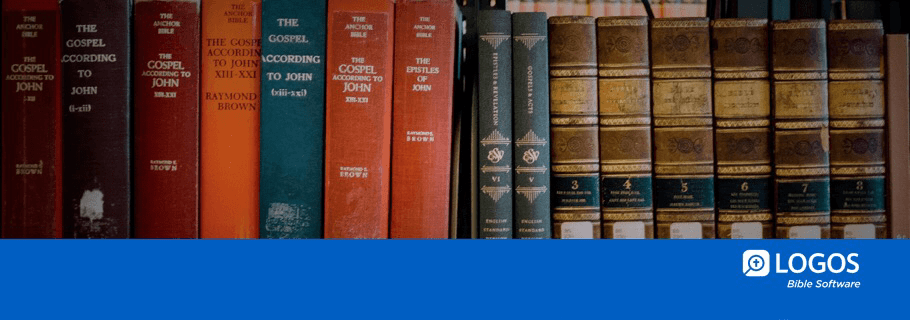This sponsored post was prepared by Tyler Smith on behalf of Logos.
After a decade of Bible college, seminary, and ministry, I’d accumulated hundreds of books. Even so, I rarely had the resources I needed to thoroughly understand and teach a passage.
Simply put, my library was big but weak.
I’ve since learned that building a solid theological library doesn’t happen by chance, and it doesn’t have to cost a fortune. Here are a few things to keep in mind when building your own library of Bible study and theology resources. And if you’re ready to build a well-rounded theological library in an instant, check out Logos 7 Starter. It’s 10% off through July 19.
Beware the lopsided library
Once, as I packed up my library and labeled the boxes, I noticed I was writing one word more than any other: commentaries. Three-quarters of my library was made up of them. But the whole point of a Bible study library is to have the resources you need to solve interpretive problems as they arise. A commentary just isn’t always the tool for the job.
If you’re starting a book study on Genesis, you don’t begin your study with “In the beginning … .” You start with a general understanding of the book and it’s literary, historical, and cultural context. Some commentaries provide extensive introductions that get you oriented, but it’s also smart to have an Old Testament survey and a biblical theology nearby. Then, as you dig in, you’ll hit words or concepts that a solid dictionary or encyclopedia can explain. You’ll want to compare English translations to expose nuances in the Hebrew. You’ll likely run into complex linguistic issues that are addressed in lexicons and other original language resources.
It can take years to accumulate the right resources. Getting them all at once is usually out of the question—no matter the size of your book budget.
Logos 7 Starter, on the other hand, includes 10 English Bible translations, six commentaries, and 11 dictionaries and encyclopedias. It has surveys of the Old and New Testaments. There are even systematic theologies, devotionals, and church history resources. All told, the library is over 100 resources strong; that’s a solid start to a well-rounded digital Bible study library—one that would cost more than $2,000 to build volume by volume. But you can get Logos 7 Starter for just $265 through July 19.
Think beyond “books”
Having thousands of resources lining your walls is one thing; getting to the information they hold—in the moment you need it—is another. That’s the biggest reason to make the leap to digital Bible study. It’s all about searchability.
Or maybe I should say “findability.”
The Logos team has gone through the entire Bible—in Greek, Hebrew, and English—and tagged every word with essential information. They’ve tracked biblical themes and people and places and things and connected them to passages in trusted biblical resources that explore them.
That means you can search your entire library for a word or concept, and find just what you need. Say you run across an unfamiliar biblical place. Just run a quick search in the Factbook, and Logos scours a database of thousands of biblical places. It gathers a short description, biblical events that occurred there, every time it is mentioned in the Bible, links to resources, maps, illustrations, and more. Whatever you have in your library that’s relevant, you’ll find here.
The same goes for people, events, cultural concepts, phrases, things—pretty much anything you’d want to find in your library or Bible, Logos has catalogued it. If you’re going to go to the trouble of building a solid biblical library, you might as well get the tools that help you use it to the fullest.
Make a smart investment
However you decide to build your theological library, the important thing is to make a wise investment. If you want to make your book budget stretch, now’s the perfect time to get started with Logos 7 Starter. Through July 19, you can get it for 10% off. Plus, we’ll send you a bonus coupon code so you can keep building your library: for every $100 you spend we’ll give you $10 off your next purchase on Logos.com.










